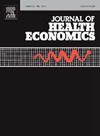Overcoming medical overuse with AI assistance: An experimental investigation
IF 3.6
2区 经济学
Q1 ECONOMICS
引用次数: 0
Abstract
This study examines the role of Artificial Intelligence (AI) in reducing medical overtreatment, a critical healthcare challenge that increases costs and patient risks. In two experiments – with 196 physicians at a hospital and 120 students at a medical school in Wuhan – we use a novel medical prescription task under three incentive schemes: flat (constant pay), progressive (pay increases with treatment quantity), and regressive (penalties for overtreatment) to estimate receptivity to AI assistance and its effects on overtreatment and treatment accuracy, and test whether effects vary with incentives. AI recommendation of a treatment is estimated to increase the probability a physician prescribes it by 25.7–28.4 percentage points (pp), with the largest effect under the flat scheme. Physicians are more receptive to AI recommendations in medical domains with which they are less familiar. We estimate that AI assistance reduces the probability a physician overtreats by 10.9–25.7 pp (15.2–80.3%), with significantly larger absolute and relative effects under the flat scheme compared to progressive and regressive schemes. AI assistance improves physicians’ treatment accuracy by 9.8–13.3 pp (14.6–19.9%), with the largest absolute effect under the regressive scheme. These findings are corroborated by the medical school experiment, which reveals that factors indicative of insufficient ability account for 34% of the explained variation in overtreatment, monetary incentives account for 22%, patient welfare considerations account for 20%, and factors related to defensive medicine for 10%. These results provide valuable insights for healthcare administrators considering AI integration into healthcare systems.
用人工智能帮助克服医疗过度使用:一项实验调查
本研究探讨了人工智能(AI)在减少医疗过度治疗方面的作用,医疗过度治疗是一项增加成本和患者风险的关键医疗挑战。在武汉一家医院的196名医生和一所医学院的120名学生的两项实验中,我们在三种激励方案下使用了一种新的医疗处方任务:持平(固定工资)、累进(随着治疗量的增加而增加工资)和递减(对过度治疗的惩罚),以估计对人工智能援助的接受程度及其对过度治疗和治疗准确性的影响,并测试效果是否随激励而变化。据估计,人工智能推荐的一种治疗方法会使医生开出处方的概率增加25.7-28.4个百分点,在扁平化方案下效果最大。在他们不太熟悉的医疗领域,医生更容易接受人工智能的建议。我们估计,人工智能辅助将医生过度治疗的概率降低了10.9-25.7 pp(15.2-80.3%),与渐进式和递减式方案相比,在扁平方案下具有更大的绝对和相对效果。AI辅助提高医生治疗准确性9.8-13.3 pp(14.6-19.9%),其中回归方案下的绝对效果最大。这些发现得到了医学院实验的证实,该实验表明,在过度治疗的解释差异中,能力不足的因素占34%,金钱激励占22%,患者福利考虑占20%,与防御性医疗相关的因素占10%。这些结果为考虑将人工智能集成到医疗保健系统中的医疗保健管理员提供了有价值的见解。
本文章由计算机程序翻译,如有差异,请以英文原文为准。
求助全文
约1分钟内获得全文
求助全文
来源期刊

Journal of Health Economics
医学-卫生保健
CiteScore
6.10
自引率
2.90%
发文量
96
审稿时长
49 days
期刊介绍:
This journal seeks articles related to the economics of health and medical care. Its scope will include the following topics:
Production and supply of health services;
Demand and utilization of health services;
Financing of health services;
Determinants of health, including investments in health and risky health behaviors;
Economic consequences of ill-health;
Behavioral models of demanders, suppliers and other health care agencies;
Evaluation of policy interventions that yield economic insights;
Efficiency and distributional aspects of health policy;
and such other topics as the Editors may deem appropriate.
 求助内容:
求助内容: 应助结果提醒方式:
应助结果提醒方式:


